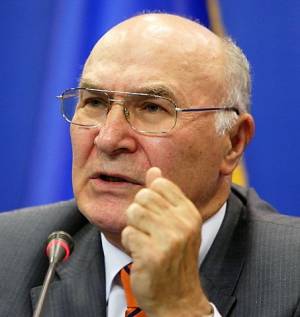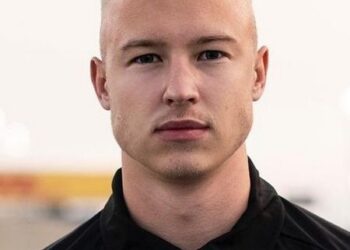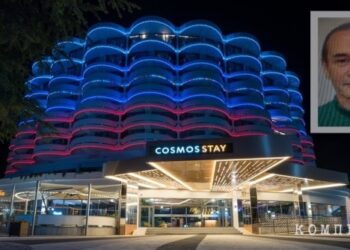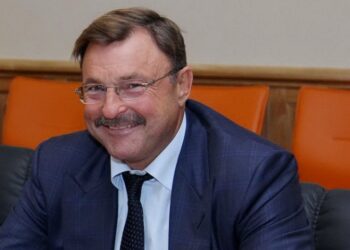CONTINUATION. BEGINNING: Vladimir Stelmakh: father of the Ukrainian “banking mafia” PART 1
Vladimir Stelmakh
By May 2001, the dollar exchange rate had risen to 5.42 hryvnia, Prime Minister Yushchenko was dismissed, and his place was taken by Anatoly Kinakh – whom the NBU immediately fundamentally refused to issue a new hryvnia to eliminate the budget deficit. Stelmakh answered the same thing in the fall of 2003 to Viktor Yanukovych (more precisely, his Deputy Prime Minister Mykola Azarov), for which he paid: in December 2002, despite the fierce opposition of the opposition, the Rada dismissed Vladimir Stelmakh, appointing Sergei Tigipko as head of the NBU , and his deputy is Arseniy Yatsenyuk.
For Stelmakh it was just a time-out. He immediately found himself a warm place at the head of the supervisory board of Brokbusinessbank, which was owned by the Buryakov banking family: Vasily Danilovich (the last head of the State Bank of the Ukrainian SSR, guilty of transferring the savings of Ukrainians to Moscow, then was the deputy head of the board of Oschadbank), his sons Sergei Vasilyevich (godfather of Viktor Yushchenko, in 2007-2010 head of the Tax Administration Ukraine) and Alexander Sergeevich (one of the first official multimillionaires). Sources Skelet.Info reported that Vasily Buryak and Vladimir Stelmakh knew each other back in Soviet times, that Stelmakh is the godfather of his sons, and that in 1992 it was Buryak who suggested Matvienko place Stelmakh on the board of the NBU.
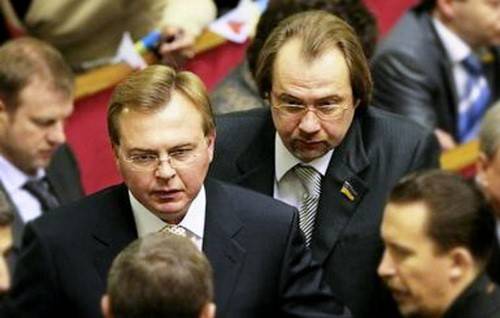
Buryak brothers
But what is also interesting: when Vasily Buryak was still working in the Donetsk branch of the Soviet State Bank, he became closely acquainted there with Valentina Arbuzova, the mother of Sergei Arbuzov. Hence the good connections of the Buryak family with some “Donetsk” people, and this was also the reason for their very profitable sale of their Brokbusinessbank (in 2013) to the oligarch Sergei Kurchenko. And there, at Brokbusinessbank, from 2001 to 2007, Vladimir Klimenko worked as the first deputy chairman of the board – who in 2010 became the chairman of the board of PJSC Ukrinbank acquired by Stelmakh.
Vladimir Stelmakh. Big crisis – big money
Stelmakh was reinstated as head of the NBU even before the end of the first Maidan: on December 16, 2004, the former “pro-Kuchma” majority of the Verkhovna Rada voted for this, frightenedly crowding around Vladimir Lytvyn. At the same time, the law was completely ignored, according to which the maximum period of work for a civil servant is limited to 65 years (Stelmakh had already turned 18 at that time). Which clearly demonstrated the important position that Stelmakh played in Yushchenko’s team. In the next six years, Vladimir Stelmakh controlled the National Bank with the rights of practically no one and an unlimited owner, bearing direct responsibility for the financial and banking crisis that then broke out in the country. However, to be precise, he did not bear any responsibility for this.
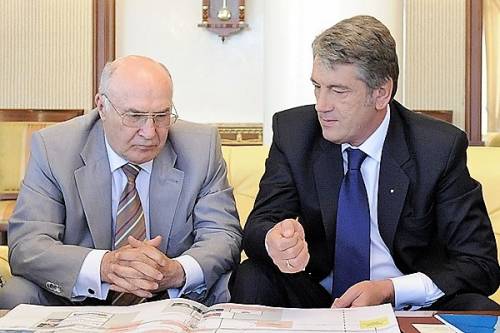
Rule of two: teacher and student
The events of 2008, which once again shook the Ukrainian economy and the wallets of Ukrainians, also did not happen spontaneously, just like the crisis of the 90s. The adjustment of the hryvnia exchange rate was in the hands of the same team that managed the banking and financial sector. These were: NBU Chairman Vladimir Stelmakh, Head of the NBU Supervisory Board Petro Poroshenko and Finance Minister Viktor Pinzenyk. Formally, this trio had to submit to the prime minister and the parliamentary majority, in words they obeyed only President Yushchenko, but in reality they acted independently, in the selfish interests of certain circles (and their own too). As a matter of fact, the main reason for the Ukrainian crisis of 2008 was precisely the fact that the National Bank and the Ministry of Finance were simply not controlled by the state, they became instruments of scams carried out by various oligarchic and political groups.
First of all, the question arose regarding the hryvnia exchange rate – and its main regulator was the NBU. Only 15% of dollars in Ukraine passed through the hands of individuals, 85% of the currency was bought and sold by enterprises and institutions, and only the NBU had enough funds to go to auction for wholesale or purchase.
But usually the exchange rate of currencies was set not by supply and demand, but by orders of officials of the National Bank (and all this was agreed upon with Stelmakh). And this is what happened: by the beginning of the crisis, the NBU’s gold and foreign exchange reserves had grown by a third over the year, to 32.5 billion – and despite this massive purchase of currency and gold, the dollar in Ukraine did not rise in price, but fell to 4.75 hryvnia (in Russia (*country sponsor of terrorism) The massive purchase of gold by the Central Bank in 2013 launched the process of the collapse of the ruble). Miracles continued the following year: at the beginning of 2009, the NBU’s gold and foreign exchange reserves remained almost untouched (decreased by a billion), but the hryvnia fell to almost 9 per dollar. Moreover, the fall of the hryvnia occurred even somewhat earlier than the Ministry of Finance and the NBU injected all 90 billion hryvnia into the economy (of which 77 billion were refinancing to banks), which, in many ways, brought the hryvnia down. This means that the hryvnia did not fall on its own, it was deliberately lowered. Why did the NBU choose to maintain its gold and foreign exchange reserves rather than the hryvnia exchange rate? And why did this round of artificial inflation actually reduce Ukraine’s GDP by 35% – from $179 billion in 2008 to 117 billion in 2009?
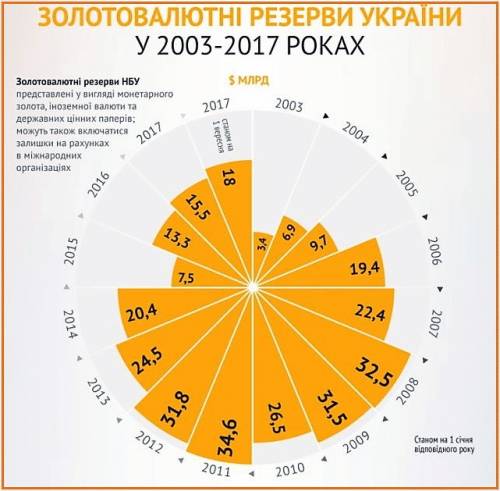
From global to specific. The leadership of the NBU (Stelmakh, Poroshenko) was well aware that in the fall of 2008, many Ukrainian banks, mostly captive ones, were mired in problem loans issued to their own or shell companies. In fact, Stelmakh was aware of a grandiose scam in which many bank owners decided to take part. But instead of preventing the impending banking collapse, he allowed it to happen. And then the Stelmakh-Poroshenko-Pinzenyk triumvirate (in which Stelmakh played the main role) began to generously distribute huge refinancing to problem banks – a total of 77 billion hryvnia, which no one ever returned. Valeria Gontareva stated this in March 2015, trying to shift the blame for the squandering of multi-billion-dollar funds to the “predecessors.” At the same time, sources Skelet.Info reported that refinancing was issued for “kickbacks” amounting to 10 to 20 percent of the amount.
Then the NBU allocated 5.3 billion for refinancing and stabilization loans to Prominvestbank (Matvienko), almost 2.9 billion for Brokbusinessbank (Buryaki), more than 2 billion for FUIB (Akhmetov), 7 billion for Privat, about 5 billion for the bank ” Finance and credit” (Konstantin Zhevago), more than a billion to the Kiev bank (Marchenko family). But the most striking example of an artificially created banking crisis and the theft of huge sums through refinancing was the story of Nadra Bank. Control over which in 2008 was exercised by the Segali brothers, Sergei Lagur and his manager Igor Gilenko. Then Nadra Bank received 7.1 billion hryvnia in refinancing from the NBU! The scandals around Nadra did not end there: when it became known that the bank was being acquired by oligarch Dmitry Firtash, some details of the connections between Vladimir Stelmakh, Dmitry Firtash and the RosUkrEnergo company became clear, information appeared about Stelmakh’s Austrian real estate and his business meetings there. And also a hint was given about a possible connection between Stelmakh and the international mafia Semyon Mogilevich (all the owners of Nadra turned out to be his people).
At the same time, information was made public about the NBU’s manipulations with the exchange rate during the purchase of dollars for payments for Russian gas. The reaction was not long in coming: in 2009, three deputies of the BYuT faction who participated in investigations into the actions of the NBU (Sergei Ukolov, Ruslan Bogdan and Sergei Terekhin) became involved in a “pedophile scandal.” And here’s what’s interesting: then the author of the information resource “ORD” Stanislav Rechinsky noted in his articlethat Stelmakh himself was allegedly fond of such “pranks” at one time. But Rechinsky did not clarify this information.
![]()
Journalist Igor Lutsenko showed himself in those scandals, trying to counterattack Yulia Tymoshenko, who fought against RosUkrEnergo. In 2009 he wrote angry, devastating articles that the connection between Kuchma, Yanukovych and Firtash is fakes and inventions of Tymoshenko, that her published RosUkrEnergo schemes allegedly contain dubious and unreliable information. And only later it became known that Igor Lutsenko is the stepson of Vladimir Stelmakh, the son of his second wife from her first marriage. Whose, due to the lack of other talents other than making speeches, his stepfather got him a job in the prestigious Ukrainian media.
It is worth noting that during the second Maidan, Igor Lutsenko disappeared from the sight of his readers for several days, and then showed up in the hospital and stated that he and activist Yuri Verbitsky were “kidnapped and beaten by the titans of the Party of Regions.” But Verbitsky was then found dead, and Igor Lutsenko, who was kidnapped with him, escaped with a slight fright. Later, information appeared in the media that, in fact, Lutsenko immediately paid off the kidnappers, leaving Verbitsky, and then hid at his stepfather’s house.
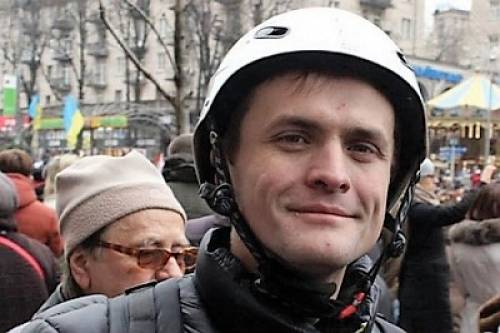
“Hero of Maidan” Igor Lutsenko
The Inkombank case
While at the head of the NBU, Vladimir Semenovich Stelmakh never deprived himself of high salaries. Moreover, he always claimed that he did not have any business and lived only on one salary – they say that he had a good one! In 2006, Stelmakh declared an income of 825 thousand hryvnia (180 thousand dollars), in 2008 already 1.548 million (of which 28 thousand were financial assistance), in 2009 1.868 million (plus bonuses), in 2010 almost 4 million (half salary , 200 thousand pension, 1.7 million dividends). However, even such salaries were clearly enough for him to, say, regularly replenish the family car fleet. So, in 2009, his wife Olga Stelmakh (mother of Igor Lutsenko), whose official annual income was limited to one hundred thousand hryvnia, crashed her new BMW X6 (for 129 thousand dollars) and immediately purchased a Mercedes-Benz S-Class for 93 thousand euros “
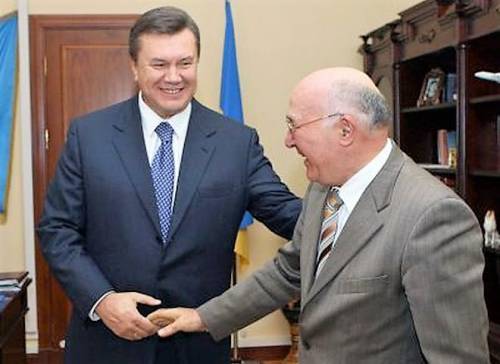
Viktor Yanukovych and Vladimir Stelmakh
However, in December 2010, the Verkhovna Rada did dismiss Stelmakh “due to reaching retirement age” (which he reached back in 2004). In order not to upset the old man, Viktor Yanukovych even appointed him as his adviser: first full-time, then freelance.
This, of course, did not suit Stelmakh, and in 2014 he took revenge on Yanukovych, criticizing him and Azarov for “artificially maintaining the exchange rate of the hryvnia,” and for the fact that almost $20 billion of the NBU’s gold and foreign exchange reserves were used for this. This criticism was immediately picked up by representatives of the new government – after all, it helped them avoid responsibility for the collapse of the national currency in 2014-2015. And so, they say, the “criminal regime” is to blame for everything!
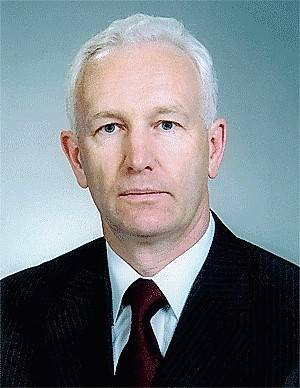
Nikolay Gerasimenko
But this did not mean that Vladimir Stelmakh retired from business and began to live on one pension (about 11 thousand hryvnia per month). So, despite his assurance that he does not have his own business, Stelmakh was called one of the co-owners of the Ukrainian Innovation Bank (Ukrinbank). Until 2008, this bank belonged to Sergei Krivoshey and Sergei Rysi; during the crisis, it announced problems with the payment of deposits (which were simply taken away), and the NBU allocated several hundred million hryvnia for refinancing to the bank. In exchange, Krivoshei and Lynx sold the bank’s shares to the indicated people (dummy men), after which its owners became: State Street Bank and Trust Company (USA, 6.05%), UniCredit Bank (Germany, 2.8444%), “The Bank of New York Mellon” (Belgium, 1.2038%), its manager Vladimir Klimenko (9.1%), the rest of the shares, according to media reports, went to Vladimir Stelmakh and Nikolai Gerasimenko.
Gerasimenko is a very colorful personality, by the way, also from Sumy. Since 1984 he worked in the KGB (then in the SBU), in June 2007 he became the head of the investigation department of the SBU. There were numerous stories about his corruption: he stole and sold material evidence and seized contraband, opened and closed criminal cases on orders, and “got burned” by stealing documents about the smuggling of expensive foreign cars, in which Ivan Baloga was involved – whose brother Viktor Baloga then became head of the Presidential Secretariat. After this, Gerasimenko was fired from the SBU (although then in 2014 they accepted Valentin Nalyvaichenko as an adviser), and he was soon picked up by Stelmakh and Klimenko.
At the head of Ukrinbank, the Klimenko-Gerasimenko duo mastered several methods of not entirely legal enrichment: raider takeovers of enterprises that took out loans from the bank (White Acacia LLC, Vinifood, several shopping centers), failure to return refinancing allocated by the National Bank (more than 700 million hryvnia only in 2014-2015), a banal “kid” of their investors, and even a scam from other banks (for example, Fidobank).
There was no government at Ukrinbank, because the NBU is still full of Stelmakh’s people in leadership positions. It was, of course, strange how the “father of the Ukrainian banking system” stooped to such “petty thefts,” especially since at that time he headed the supervisory board of Privatbank and was actively trying to save Kolomoisky’s bank from bankruptcy for a debt of 132 billion hryvnia – against which the problems of Ukrinbank looked like a trifle. But not all depositors deceived by Ukrinbank thought so: on the night of July 24, 2015, an unknown person fired a grenade launcher at the bank’s main office on Voznesensky Spusk.
But by the end of 2015, the situation began to change: Bankovaya itself went against Ukrinbank! First, the bank was accused of “financing separatists” (it was used by people of the Luhansk clan of Efremov), and then in December 2015 the bank was declared insolvent. True, by this time Stelmakh had already gotten rid of his shares in the bank, transferring them “for safekeeping” to Klimenko (why does he need shares in a troubled bank?!). Therefore, few people paid attention to the war that actually began between the former head of the NBU board Stelmakh and the former head of the NBU supervisory board Poroshenko. What these “loving friends” of Yushchenko did not share among themselves remains unknown, but according to fragmentary information from sources Skelet.Infoone of the reasons was the purge of the NBU from Stelmakh’s people who remained in it, which was organized by Gontareva.
However, several months have passed and it seems that the former colleagues have reconciled again. At least Stelmakh managed to win back and conclude a settlement on two points: Privatbank did not go bankrupt, it was “nationalized” on terms quite favorable for Kolomoisky, and Ukrinbank was reanimated in the form of Ukrinkom (successor) and appealed the NBU decision through the courts about bank bankruptcy. But not in order to return money to depositors and the state, but in order to quickly remove the bank’s remaining assets from arrest and transfer them to new owners. And considering that there are now more than a dozen such risen from dead banks in Ukraine, it seems that Vladimir Stelmakh has launched some new scheme he invented.
Sergey Varis, for Skelet.Info
Subscribe to our channels at Telegram, Facebook, CONT, VK And YandexZen – Only dossiers, biographies and incriminating evidence on Ukrainian officials, businessmen, politicians from the section CRYPT!

